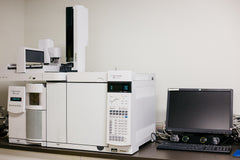After complete processing of Essential Oil it is necessary to check oil purity. EOC Checked all products purity with Indian Government lab.
Our Quality Control Standards include:
- Verification of the plants botanical species
- Crops were not subjected to agrochemicals
- Low pressure distillation techniques employed
- Visually inspecting the oil
- Odour evaluation of the oil
- Measuring the oils physical parameters
- Testing the oils purity using GC or GC/MS technology
We believe that essential oil quality control should begin at the earliest stage of production, preferably with inspection of the crop at the growing phase. This important aspect is often overlooked when considering quality issues, and this is why we have established close working relationships with growers around the world.
When growing plants specifically for the extraction of essential oils, the location, altitude, fertility of the soil, weather conditions and the method of cultivation all have an influence upon its oil content and quality. This is why an essential oil produced in one country can be of a higher quality than precisely the same oil produced in another. And it end there.
At the extraction stage, the skill and experience of the distillery becomes the next critical factor in the quest for excellence, since all the expertise and effort of the farmer will have been wasted if the oil is not extracted correctly.
The importance of purity with essential oils can not be over-stated, if for no other reason than maintaining the good reputation of aromatherapy. Cheaper, inferior quality essential oils deliver poor results and mean that ultimately you will have wasted your hard earned money, rather than saving any of it.
 Using cheap essential oils can often be a bit of a gamble too. At best, nothing at all will happen - in other words you will not receive any benefits, but at the worst you may have an allergic reaction to the oil and experience skin irritation, sensitisation, or other undesired side effects.
Using cheap essential oils can often be a bit of a gamble too. At best, nothing at all will happen - in other words you will not receive any benefits, but at the worst you may have an allergic reaction to the oil and experience skin irritation, sensitisation, or other undesired side effects.
Unwanted side effects are usually caused when an essential oil has been adulterated with a synthetic chemical component, or perhaps because it is entirely synthetic. Unscrupulous traders and dealers will often 'stretch' expensive oils by adding cheap synthetics to them to make the product more profitable for themselves.
This type of adulteration can cause problems for unsuspecting customers who then attempt to use these oils in aromatherapy - sometimes with disastrous results. Many people are allergic to synthetic compounds, hence the move to 'fragrance-free' cosmetics.Of course not everyone is sensitive to synthetic or adulterated oils so the problem should not be exaggerated, but it is still unethical and dishonest for a supplier to sell an adulterated or synthetic oil under the pretence that it is a natural, pure essential oil.After all, you are paying for something that you are not getting. Synthetic or adulterated oils contain little or no therapeutic qualities and will not produce the results that you are looking for.